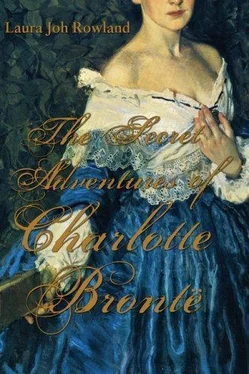Laura Rowland - The Secret Adventures of Charlotte Bronte
Здесь есть возможность читать онлайн «Laura Rowland - The Secret Adventures of Charlotte Bronte» весь текст электронной книги совершенно бесплатно (целиком полную версию без сокращений). В некоторых случаях можно слушать аудио, скачать через торрент в формате fb2 и присутствует краткое содержание. Жанр: Исторический детектив, на английском языке. Описание произведения, (предисловие) а так же отзывы посетителей доступны на портале библиотеки ЛибКат.
- Название:The Secret Adventures of Charlotte Bronte
- Автор:
- Жанр:
- Год:неизвестен
- ISBN:нет данных
- Рейтинг книги:5 / 5. Голосов: 1
-
Избранное:Добавить в избранное
- Отзывы:
-
Ваша оценка:
- 100
- 1
- 2
- 3
- 4
- 5
The Secret Adventures of Charlotte Bronte: краткое содержание, описание и аннотация
Предлагаем к чтению аннотацию, описание, краткое содержание или предисловие (зависит от того, что написал сам автор книги «The Secret Adventures of Charlotte Bronte»). Если вы не нашли необходимую информацию о книге — напишите в комментариях, мы постараемся отыскать её.
The Secret Adventures of Charlotte Bronte — читать онлайн бесплатно полную книгу (весь текст) целиком
Ниже представлен текст книги, разбитый по страницам. Система сохранения места последней прочитанной страницы, позволяет с удобством читать онлайн бесплатно книгу «The Secret Adventures of Charlotte Bronte», без необходимости каждый раз заново искать на чём Вы остановились. Поставьте закладку, и сможете в любой момент перейти на страницу, на которой закончили чтение.
Интервал:
Закладка:
Although the wind now blew rain against me and tugged at my umbrella, I welcomed solitude. But solitude was not to be mine. As I neared the bottom of the lane, I was accosted by the Reverend Arthur Bell Nicholls.
“Good day, Miss Bronte,” he said in his thick Irish brogue. “May I walk with you?”
Mr. Nicholls had come from Dublin to be Papa’s curate. A man of twenty-nine years, he had heavy dark brown hair and eyebrows, heavy features, heavy legs, and a stolid, serious nature. I found him annoying, for he often sought me out although I could not imagine why. I reluctantly let him share my umbrella and accepted his company.
We walked down Main Street, through the village. The rows of stone cottages were grimy with peat smoke and dripping with rain. Mr. Nicholls and I skirted gutters overflowing with malodorous drainage from cesspits. Haworth is a poor, unhealthful place riddled with poverty born of slumps in the textile industry. Damp, tiny cellar dwellings house large families, fevers rage, and funerals comprise a large part of Papa’s duties. That day the village seemed even smaller and poorer than usual, after my recent adventures in London.
I refrained from speech in the hope that my companion would grow bored and leave me, for I wanted to think about Gilbert White. Mr. White and I had talked together on the train all the way from Keighley to Haworth. We at first discussed Isabel, but soon our conversation turned personal. I told Mr. White how I had happened upon some poems written by Emily and thought to publish a book of poetry by my sisters and myself. I admitted that only two copies had sold, but the venture had spurred me to attempt novels. Mr. White told me about growing up in the town of Bradford, his father’s fatal accident in a factory, and how charity had paid for his education at boarding school, then divinity college at Oxford. We had much in common-our Northern origins, our lives as charity children, our faith. He became the most intimate male acquaintance I’d ever had.
Before we parted at Keighley Station, he jotted on a paper the address of his vicarage, presented it to me, and said, “Shall we write to each other?”
“Do you mean-if I remember anything else about the men on the train-or if you learn anything from your mother?” I asked, astounded because no man I admired had ever before asked me to correspond with him. “Why, yes, of course.”
“Whatever you choose to write, I’ll be delighted to read,” Mr. White said earnestly.
I thought it prudent to wait until he wrote before writing him a letter, and while I waited, I relived every moment spent with him. I dressed my hair with undue care, as if he could see me; we carried on imaginary conversations in my mind. For a woman to nurture affection without proof of requital is sheer folly, as I well knew, but I could not help myself.
Now Arthur Nicholls said, “Yesterday, at the stationer’s shop, I met a stranger.” Close beside me under the umbrella, he smelled of cooked cabbage. How I wished I had Gilbert White as my companion instead! “He asked about you, Miss Bronte.”
“Oh?” I said, bored by anything the curate had to say.
“He wanted to know who your family and friends are, what you do, and what kind of character is yours,” said Mr. Nicholls.
Uneasiness stirred in me; the rain and gusting wind seemed colder than a moment ago. “What was this man’s name?”
“He didn’t say.”
My uneasiness quickened into alarm. “Well, what did he look like?”
“I didn’t really notice.”
“What did you tell him?”
“Nothing, of course. I don’t gossip to strangers.” Mr. Nicholls looked affronted.
There are people who have no notion of sketching a character or perceiving salient points of persons or things, and Mr. Nicholls belongs to this class. Would that he were as good at observation as he was discreet! Could the stranger be one of the men who had assaulted Anne and me on the train? I looked down Main Street towards the village green and the toll gate. Suddenly Haworth didn’t seem so isolated as before.
“Miss Bronte, I hope you’ve not been doing anything to attract improper attention from strange men,” Mr. Nicholls said in a tone of sententious concern. “As the daughter of a clergyman, you should be careful about your behavior, lest it reflect badly upon your father or the Church.”
How dare he assume I was at fault and tell me how to act? “You do seize upon any chance to sermonize.”
“Yes; it is my duty,” Mr. Nicholls said seriously, interpreting my tart rejoinder as praise.
It was a pity that Mr. Nicholls couldn’t be like Gilbert White, who’d cared more for my safety than about public opinion. Still, I knew Mr. Nicholls to be a good man, held in high regard by Papa and the parishioners. Perhaps Anne and Emily and I shouldn’t have stolen his middle name as our nom de plume, although we’d enjoyed our secret joke.
Afraid that I would say something regrettable if Mr. Nicholls and I continued together, I halted. “Here’s the post office. I must step inside.” I said firmly, “Goodbye, Mr. Nicholls,” entered the building, and left him standing alone in the rain.
Inside the post office, drawers and compartments lined the walls. Behind the counter sat the postmistress, Nancy Wills, a stubby woman with frizzy grey hair beneath her muslin cap.
“Oh, Miss Bronte,” she said, “I heard tha was back from London. It were a nice trip, I hope? I saw your pa the other day when he come from visitin’ the Oaks farm. They’ve got th’ fever there.”
More village gossip followed. When she paused for breath, I handed her my letter and said, “Is there any post for me?” As Nancy began searching through letters and parcels, a thought struck. “Has there been a stranger asking about me?”
“Matter of fact, there was,” Nancy said. “It were two days ago. A man were botherin’ me with all sorts of questions, like who do tha send letters to or get them from.”
I felt a ripple of foreboding. “You didn’t answer him, did you?”
Nancy’s cheeks flushed. “Nor me. I told him to mind his own business.” She turned away and mumbled, “I think I did see something for thee, Miss Bronte. Now where can it be?”
I shuddered to think that a murderer may have tapped her extensive store of knowledge about my family. “Can you describe the man?”
“Oh, he were a gentleman with black hair and city ways.” Nancy tittered. “Fair handsome, too.”
At least she had better powers of observation than did Mr. Nicholls, even if she lacked his discretion. The stranger could have been the dark man from the train. If he now knew where I lived, why had he not approached me?
While I stood stricken by fear, the postmistress exclaimed, “Oh! Here it is!”
She gave me a flat rectangular package that was approximately seven inches long, wrapped in brown paper and tied with string. It had a London postmark, but no sender’s address. “Whoever could have sent thee a present?” she said with expectant curiosity.
My thoughts flew to Gilbert White. Had he gone back to London and from there sent Jane Eyre for me to inscribe? Would there be a letter? Happy anticipation replaced my earlier fear. I hurried home and shut myself into the room above the front hall. With trembling fingers I unwrapped the package.
A letter is a wondrous treasure. Letters from my friends and family had comforted me while I was away from home. The absence of letters caused terrible unhappiness; I once had waited three years for a letter that never arrived. This time, however, fortune had blessed me.
Inside the package was a book wrapped in the same brown paper as the entire parcel-I could feel the curved spine and the edges of the binding. A sheet of white paper bearing a few lines of script accompanied the book. As I eagerly read the letter, anticipation turned to shock. Dear Miss Bronte, Forgive me for initiating a correspondence which you did not authorize and may not welcome. But I am in desperate straits, and I must presume upon you. Enclosed is a package. I beg you to deliver it, unopened, to my mother, Mrs. Mary White, 20 Eastbrook Terrace, Bradford, Yorkshire. Thank you for your kindness. I hope I will be able to repay it someday.
Читать дальшеИнтервал:
Закладка:
Похожие книги на «The Secret Adventures of Charlotte Bronte»
Представляем Вашему вниманию похожие книги на «The Secret Adventures of Charlotte Bronte» списком для выбора. Мы отобрали схожую по названию и смыслу литературу в надежде предоставить читателям больше вариантов отыскать новые, интересные, ещё непрочитанные произведения.
Обсуждение, отзывы о книге «The Secret Adventures of Charlotte Bronte» и просто собственные мнения читателей. Оставьте ваши комментарии, напишите, что Вы думаете о произведении, его смысле или главных героях. Укажите что конкретно понравилось, а что нет, и почему Вы так считаете.












